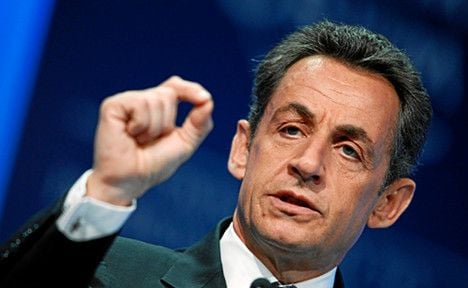Sarkozy, who this week said France had too many foreigners, made the threat at a mass meeting which he hopes will turn the tide against front running Socialist Francois Hollande with just 42 days to go before election day.
The so-called Schengen passport-free zone must urgently be overhauled to fight the flow of illegal immigration, said the right-wing leader, returning to a constant theme in his bid for five more years at the Elysee palace.
To chants of “Nicolas, president!” from the tens of thousands in the flag-waving audience, Sarkozy said unchecked immigration would put extra strain on social safety nets for Europe’s poorest.
“In the coming 12 months, (if) there is no serious progress towards this (reforming Schengen), France would then suspend its participation in the Schengen accords until negotiations conclude,” he declared.
The Schengen area is home to 400 million Europeans who can cross borders without a passport, and once inside the area illegal immigrants can theoretically move freely between the participating states.
Sarkozy accuses some EU states of having lax border controls that let in illegals who may later turn up in France.
Sarkozy’s UMP party chartered TGV high-speed trains and fleets of buses to ferry supporters from across France for the rally in a cavernous exhibition hall in Villepinte, near Paris Charles de Gaulle airport.
Sarkozy also said he wanted the EU to introduce a “Buy European Act” based on a US measure that obliges the state to use domestically produced products in public contracts.
If the European Union did not do this within a year, he would, if re-elected in the two-round vote in April and May, implement a unilateral “Buy French” law, he said.
“I want a Europe that protects its citizens. I no longer want this savage competition,” he told the crowd, which the UMP estimated at 70,000. He rejected the idea of “a Europe that opens up its markets when others do not”, he said.
“I have lost none of my will to act, my will to make things change, my belief in the genius of France,” he insisted.
Sarkozy produced few surprises, sticking to familiar themes such as immigration and portraying himself as the steady captain steering France through the economic storm.
He got the loudest cheer of the rally when he reminded his supporters he had banned Islamic veils in France and was opposed to having special Islamic halal meals in school canteens.
“It was to give back to women control of their destiny that we wanted to ban the burqa…,” he told the crowd.
Sarkozy a week ago picked up on a debate about halal meat launched by Le Pen, declaring that its spread was a major problem for the French.
But his critics have accused him of fishing for support from voters who lean towards the National Front, the anti-immigrant, anti-EU party led by Marine Le Pen, who polls put in third place in the presidential race.
Hollande, who has never held a ministerial post and whose ex-partner Segolene Royal lost to Sarkozy in 2007, this week pressed home his attacks on his rival’s record in five years at the Elysee palace.
He mocked Sarkozy’s plan to slap a new tax on the profits of listed companies. The president said Tuesday it would bring in up to €3 billion euros ($3.9 billion) a year to help cut the public deficit.
An OpinionWay-Fiducial opinion poll on Thursday forecast that Hollande would take 29 percent of the vote in the first round, with Sarkozy at 26 percent and Le Pen third at 17 percent.
Hollande, who has enjoyed a clear lead for five months, would romp home in the second round with 56 percent, well ahead of Sarkozy at 44 percent, the poll said.
Among the celebrities at the rally were actress Emmanuelle Seigner, wife of Roman Polanski, and actor Gerard Depardieu.
Depardieu described the president as frank and honest and said that since Sarkozy had been in power, “I only hear bad things about this man who only does good”.




 Please whitelist us to continue reading.
Please whitelist us to continue reading.
Member comments